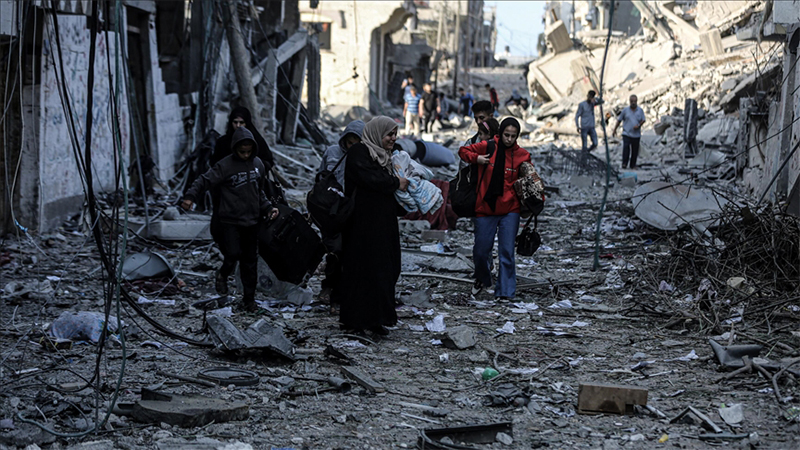ON December 5, lawmakers extensively questioned top university leaders during a congressional hearing, focussing on the issue of antisemitism prevalent on college campuses. During a heated moment, Republican congresswoman Elise Stefanik raised the question of whether “advocating for the annihilation of Jews” violates university policies. Liz Magill, president of the University of Pennsylvania, responded that it was “context-dependent.”
This contentious exchange circulated widely on X, previously known as Twitter. Yad Vashem, a Holocaust museum and research center, denounced the incident and emphasised the significance of “promoting awareness regarding the history of antisemitism and the Holocaust.”
A notable lack of awareness exists among a segment of young Americans regarding one of the most significant atrocities in recent history.
Now for the harder part: why do young Americans think that the Jews wield too much power in America? More informed and aware public? Social media might play a role? An out-there, vocal Gen-Z?
The social media is brimmed with conspiracy theories and of course there is a clear correlation between the frequency of social media usage and the consumption of and trust in the news. All of us are aware of the skewed narratives controlled and presented by the Jews and their mouth pieces, be it the puppet media, the unwavering support of the allies, or the one-sided organizations created, decided and vetoed by them.
As the genocide in Gaza nears its sixth month, Israeli troops are aggressively advancing into the densely populated southern region of the coastal enclave. In the fiercest combat witnessed yet, their objective is to cause extensive harm to Palestinian civilians before the political clock runs out on what could be their final extensive ground operation in the war.
Time is running out
The international backing, along with Israel’s defined period of legitimate military action, is diminishing due to the bloody loss of civilian lives in Gaza. Meanwhile, the administration of Gaza is crumbling at an unprecedented rate: It has brought a stark and distressing economic reality in Ramallah, serving as the de facto capital of the West Bank. Supermarkets have resorted to hiring security personnel to fend off increasing incidents of theft.
Numerous businesses have closed down, contributing to an economic crisis perceived to be more severe than the repercussions of the Covid-19 lockdowns. Since October 7, approximately 160,000 Palestinians employed in Israel and West Bank settlements have seen their work permits revoked, while tens of thousands more worked in Israel illegally. Prior to the war, their salaries injected around 1.4 billion shekels ($370 million) monthly into the West Bank’s economy.
The idea of a two-state solution was once popular. Even entertained by the international community. But many have lost faith now. It cannot be done. And amidst this disappointment, a distinct alternative path is still not evident. While some contend for a single state, envisioning a scenario where they can peacefully coexist with equitable rights, others are proponents of either apartheid or ethnic cleansing (with conflicting opinions regarding the targeted victims under such a strategy). Both of which are not feasible.
The resistance on October 7 disrupted it all. The 75-year long genocide is evident. Forcible removal is completely unacceptable. While a unified state resolution may appear logical, it is essentially impractical due to its rejection by the majority of Israelis and Palestinians.
Consequently, the only viable option remaining is the establishment of two separate states. However, the challenge lies in the immense sacrifices required from both the sides. Israelis would need to relinquish territory, while Palestinians would have to abandon a significant portion of the land they’ve lost since 1948. Leaders from both factions would have to persuade a doubtful public to accept these compromises. Regrettably, neither side possesses leaders capable of achieving this task.
Israel is led by Binyamin Netanyahu, whose entire career has been devoted to thwarting the creation of a Palestinian state, evoking deep-seated negative emotions and opposition from many of his own people. Subsequently, his political clock is ticking fast. The majority of Israelis are eager to see him removed from office. Benny Gant is the leading candidate poised to take over from him. He has become a rarity within Israel’s divided political landscape: someone who brings people together.
On the other hand, Palestinian politics is questionable with three decades of narrative-fed spoilers. This has soured a whole generation of people on what ‘peace’ is during the second intifada, or uprising. A serious push for peace is expected of Mahmoud Abbas, the Palestinian president, to unite a fractured nation. However, he is 88 years old.
The risk, then, is that history repeats itself. Israel will tone down its hostility. The Gulf states will work with commercial interests. And the deal with Palestine-Israel will basically be the same. The realization of losing hope is terrible.
But this is not a generation of people who will forget. Any time soon. The graves of their parents. The shrapnel in the leg of a 7-year-old. Women giving birth without anesthesia. Newborns left to die in incubators. And countless horrifying images of the inhumane carnages that have made headlines in the papers. The events since October 7 show the status quo is untenable. Change is inevitable. The only question is what form it will take.
